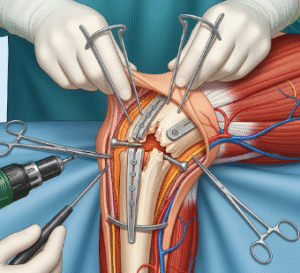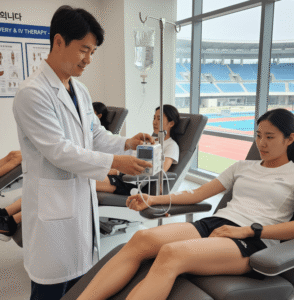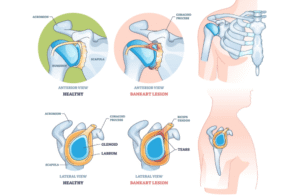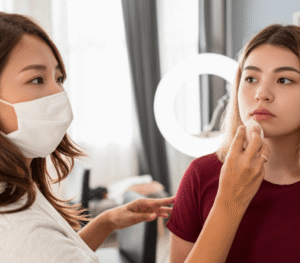Overview
Syphilis is a sexually transmitted infection (STI) caused by the bacterium Treponema pallidum. If left untreated, it can progress through several stages, causing serious complications in multiple organs. In Korea, syphilis cases have fluctuated over recent years, with increasing public health attention given to STI prevention, early diagnosis, and comprehensive treatment services.
What is Syphilis?
Syphilis is a bacterial infection primarily spread through sexual contact, including vaginal, anal, and oral sex. It develops in four stages: primary, secondary, latent, and tertiary. The disease can remain dormant (latent) for years, but without treatment, it may cause severe damage to the heart, brain, and other organs. It can also be transmitted from mother to child during pregnancy, leading to congenital syphilis.
Symptoms
Symptoms vary depending on the stage:
Primary Stage
- A single painless sore (chancre) at the site of infection (genitals, anus, or mouth)
- Appears about 3 weeks after exposure
- Heals without treatment in 3–6 weeks
Secondary Stage
- Skin rashes (especially on palms and soles)
- Fever, fatigue
- Swollen lymph nodes
- Sore throat
- Hair loss
- Muscle aches
- Mucous patches in the mouth or genitals
Latent Stage
- No visible symptoms
- Bacteria remain in the body and may cause damage later
Tertiary Stage (develops in 15–30% of untreated cases)
- Brain and nerve problems (neurosyphilis)
- Heart and blood vessel damage
- Organ failure
- Death, in severe cases
Congenital Syphilis (from mother to baby)
- Stillbirth or miscarriage
- Bone deformities
- Developmental delays
- Seizures and blindness
Causes
- Caused by Treponema pallidum
- Transmitted through:
- Unprotected sexual contact
- Direct contact with a syphilitic sore
- Sharing needles (rare)
- From infected mother to fetus (vertical transmission)
Risk Factors
- Unprotected sex
- Multiple sexual partners
- History of other STIs or HIV
- Men who have sex with men (MSM)
- Sex workers or clients of sex workers
- Inadequate prenatal screening
Complications
- Neurosyphilis (affecting brain and spinal cord)
- Cardiovascular syphilis (aortic aneurysm, valve disease)
- Blindness or deafness
- Mental illness or dementia
- Birth defects in newborns (if untreated during pregnancy)
- Increased risk of HIV transmission
Prevention
- Use of condoms during all types of sex
- Regular STI screening, especially for high-risk groups
- Monogamous relationships with an uninfected partner
- Avoid sharing needles or personal items
- Prenatal screening and treatment during pregnancy
- Public awareness campaigns and sex education
Treatment Options in Korea
1. Diagnosis
Korean hospitals and clinics offer confidential testing options:
- Blood tests
- VDRL (Venereal Disease Research Laboratory)
- RPR (Rapid Plasma Reagin)
- FTA-ABS (Fluorescent Treponemal Antibody Absorption)
- Dark-field microscopy – to directly observe Treponema pallidum from a sore
- Spinal fluid test – in suspected neurosyphilis
Many public health centers across Korea offer free and anonymous STI testing.
2. Treatment
- Primary, secondary, and early latent syphilis:
- Single dose of intramuscular Benzathine penicillin G
- Late latent or unknown duration:
- Three doses of Benzathine penicillin G at weekly intervals
- Neurosyphilis or ocular syphilis:
- Intravenous aqueous penicillin G for 10–14 days
- Penicillin allergy:
- Doxycycline or azithromycin (only in non-pregnant adults)
- Penicillin desensitization is recommended for pregnant women with allergies
Patients must avoid sexual activity until sores heal and the treatment course is completed.
3. Support and Public Health Measures
- The Korea Disease Control and Prevention Agency (KDCA) conducts STI surveillance
- HIV/Syphilis co-testing encouraged for high-risk populations
- Sex education and awareness programs in schools and communities
- Confidential partner notification and counseling services













